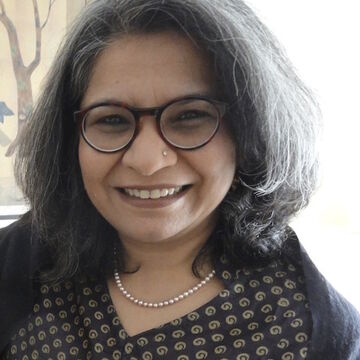

Savneet K Talwar
Professor
Contact
Bio
Professor, Art Therapy (2008). PhD, 2010, University of Maryland; BA, 1986, Punjab University; MA, 1992, Southern Illinois University, Edwardsville; Certificate in Child and Family Therapy, 1995, St. Louis Psychoanalytic Institute. Credentials: Registered and Board Certified Art Therapist; Licensed Professional Counselor. Publications: Arts in Psychotherapy; Art Therapy: Journal of the American Art Therapy Association; Gender Issues in Art Therapy and the author of Art Therapy for Social Justice: Radical Intersection published by Routledge.
Personal Statement
Savneet Talwar, Professor is the Chair of the graduate art therapy and counseling program at the School of the Art Institute of Chicago. She is a member of the Critical Pedagogy in the Arts Therapies think tank. Her current research examines feminist politics, critical theories of difference, social justice and questions of resistance. Using an interdisciplinary approach, she is interested in community based art practices; cultural trauma; performance art and public cultures as they relate to art therapy theory, practice and pedagogy. She is the author of Art Therapy for Social Justice: Radical Intersection and has published in Arts in Psychotherapy, Art Therapy: Journal of the American Art Therapy Association, and Gender Issues in Art Therapy. She is also the founder of the CEW (Creatively Empowered Women) Design Studio, a craft, sewing, and fabrication enterprise for Bosnian and South Asian women at the Hamdard Center in Chicago. She is the past Associate Editor of Art Therapy: Journal of the American Art Therapy Association.
Refereed Journal Articles, Book Chapters and Commentaries
Talwar, S. (2019). Feminism as Practice: Craft, Labor, and Art Therapy. In S. Hogan’s (Eds) Inscribed on the Body: Gender and Difference in the Arts Therapies. New York, NY: Routledge.
Talwar, S. (2019). Art therapy for social justice: Radical intersections. New York, NY: Routledge.
Yi, S. & Talwar, S. (2018). Disability, art, and art therapy. In C. Sandahl, T. Heller, S.P. Harris, C. Gill, & R. Gould’s (Eds.) Disability in American life: An encyclopedia of concepts, policies, and controversies. Santa Barbara, CA: ABC-CLIO.
Guest Editor: Talwar, S. (2017). Law, ethics, and cultural competence in art therapy. Art Therapy: Journal of the American Art Therapy Association, 34 (3), 102-105.
Guest Editor: Talwar, S. (2016). Is there a need to redefine art therapy? Art Therapy: Journal of the American Art Therapy Association, 33(3), 116-118.
Guest Editor: Talwar, S. (2015). Culture, diversity and identity: From margins to center. Art Therapy: Journal of the American Art Therapy Association, 32(3), 100-103.
Talwar, S. (2015). Creating Alternative Public Spaces: Community-Based Art Practice, Critical Consciousness and Social Justice. In David Gussak and Marcia Rosal’s The Wiley-Blackwell Handbook of Art Therapy. Oxford, UK: Wiley Blackwell.
Talwar, S. (2013). Revisiting Feminist Approaches to Art Therapy, by Susan Hogan (Ed.), book review. Art Therapy: Journal of the American Art Therapy Association, 30 (3).
Talwar, S. (2010). Performance art and the politics of an archive: Mary Coble’s “Note to Self,” John Douglas Taylor Conference 2010: The Archive in Everyday Life Proceedings http://www.humanities.
Talwar, S. (2010). An intersectional framework for race, class, gender, and sexuality in art therapy. Art Therapy: Journal of the American Art Therapy Association, 27,(1) 11-17.
Talwar, S. (Winter, 2010). Electing our first president- elect of color: Mercedes ter Maat. American Art Therapy Association Newsletter, XLIII, (1) 25.
Talwar, S. (2007). Accessing traumatic memory through art making: An art therapy trauma protocol (ATTP). Arts in Psychotherapy , 34 (1) 22-35.
Talwar, S. (2006). Neuropsychology of art: Neurological, cognitive and evolutionary perspectives, by Dahlia Ziadel. (2005), book review. Art Therapy: Journal of the American Art Therapy Association, 23 (2) 4.
Talwar, S. (2006). Commentaries, Art Therapy: Journal of the American Art Therapy Association, 23 (1) 4.
Talwar, S. (2005). Studio 360, National Public Radio – Born in brothels, interviewed for the Oscar winning documentary film about children born in the Calcutta brothels.
Talwar, S. (2004). A framework for immigration: Asians in the United States, by Uma Segal (2002), book review. American Studies International: The Journal of Internationalist Americanist.
Talwar, S., Iyer, J. & Doby-Copeland, C. (2004). The invisible veil: Changing paradigms in the art therapy profession. Art Therapy: Journal of the American Art Therapy Association, 21(1) 44-48.
Iyer, J., Talwar, S. & Doby-Copeland, C. (2003). Deconstructing Kaplan’s views on multiculturalism. Art Therapy: Journal of the American Art Therapy Association, 20(2) 65-66.
Talwar, S. (2002). Decolonisation: Third world women and conflicts in feminist perspectives and art therapy. In Susan Hogan's Gender Issues in Art Therapy (pp. 185-193). London, England: Gender Issues in Art Therapy.